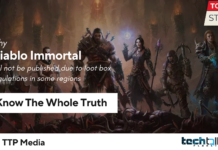Opening a new front inside the fight to conquer digital gaming, Amazon is spending hundreds of millions of dollars making games & to become a leading video game developer and distributor.
The internet giant said it planned to release the first original big-budget title, an ambitious sci-fi shooter called “Crucible” in May after many delays associated with coronavirus. It is also creating a full-fledged system for cloud gaming under the codename Project Tempo. And it is coming up with new casual games that broadcasters can play alongside viewers in real-time on its popular Twitch streaming platform.
The push is the most important investment in original content by Amazon since it has become a major web series and movie producer in the past decade. Also, Amazon is aiming at competitive rivals like Google and Microsoft which now have increased video game offerings.
The company has bestowed the name Relentless Studios on its landmark game project in Seattle in a demonstration of Amazon’s dedication to video games and the stamp of approval of its founder, Jeff Bezos. Bezos was initially considering calling his company Relentless.com and owning the domain himself, which still points to Amazon.
“The big picture is about trying to take Amazon’s best and bring it to games,” said Mike Frazzini, vice president of gaming services and studios at Amazon, who is primarily leading the games strategy. “We’ve been working a while, but making games takes a long time, so we’re taking tons of Amazon’s approach to make games.” The ultimate prize: drawing millions of users to Amazon’s service ecosystem. Video games have bloomed into one of the most successful — and lucrative — types of entertainment throughout the world over the last decade.
Gaming is projected to produce revenue of more than $160 billion in 2020, putting the company at more than twice the scale of the global recorded music industry (around $19 billion) & the worldwide film box office (around $43 billion). Now, with most of the world remaining at home in the pandemic, the popularity of video games is growing.
Next month, Amazon plans to ship not only “Crucible” but also “New World,” a “huge online multiplayer” game where thousands of players inhabit a massive 17th century fantasy realm. “Crucible” was designed by Relentless in Seattle, but “New World” was produced by a different Amazon game company in Irvine, California, founded in 2014 after Double Helix Games was bought by the firm.
In addition, the Irvine studio is creating a massive multiplayer game based on “King of the Rings.” John Smedley, a former Sony Online Entertainment president, joined Amazon in 2017 to open a third internal Amazon game studio in San Diego, but his latest project is not announced.
With these in-depth video games, Amazon pursues hard-core gamers, who are usually the world’s most demanding.
If “Crucible” and “New World” succeed, Amazon will not only create a video games company but will also demonstrate its technology tools’ potential. The company has developed a game development system called Lumberyard and aims to leverage the power of its cloud computing infrastructure to offer groundbreaking gaming experiences, such as huge multiplayer battles in “New World.” Frazzini, Amazon’s game leader, switched from the company’s book division to its consumer game segment in 2009. He quickly noticed an opportunity for Amazon to start selling cloud computing services to developers of games and start the road towards producing its own top-end games. He said it hadn’t been difficult to persuade Amazon to move into video games.
“People love video games & it was really clear to all,” he said. “It was so clearly important for consumers that we had to do it.” “Crucible,” a team-based fighting game, borrows elements from “battle arena” games such as “League of Legends” and “Dota 2” to add a more strategic dimension to the traditional shooter formula. Louis Castle, a longtime game’s executive recruited by Amazon to run Relentless, said “Crucible” has been updated several times since it went into development in 2014, concentrating on competitive online play and Twitch live streaming.
“It’s the active participation of hundreds of people over a very extended period of time that contributes to a successful product,” said Castle, crediting Amazon’s deep pockets to help the “Crucible” team. “Thankfully, we’re with an organization that has the capital to let this new team gel & get a great expression out there.” “Crucible” was expected to be published on March 31 early last month. The start date was postponed to April 14 after coronavirus restrictions clashed with marketing plans. On March 23, Frazzini, Castle as well as other executives held a videoconference on Amazon’s internal chime conference system from their homes and agreed to postpone Crucible back to May. “We just don’t know where the world will be in a few weeks,” Castle said. The executives decided to postpone the game, he said, “instead of placing a lot of pressure and stress on a team that has worked very hard for several years of their lives when they might be going through some very tough times with themselves or loved ones.” After launching “Crucible” and “New World” in May, Amazon plans to release interactive games over the summer on Twitch. Millions of viewers are now only watching other people play games on Twitch, but Amazon is trying to crack the virtual wall.
“We love this idea that you have a player, a streamer and a viewer all sharing in this synchronous interactive environment of Twitch,” Frazzini said.
Amazon’s concealed cloud-gaming initiative, Project Tempo, is much broader. The calculations needed to run a video game are usually performed on a player-owned console, computer, or mobile device. But All the processing occurs in a corporate data farm with a cloud service. That can enable users to access games without downloading on non-high-end devices.
Google launched last year’s premier cloud gaming service, Stadia. In February Nvidia, the graphics chip leader, launched GeForce Now, a cloud gaming platform. Microsoft is designing its own version of the platform, Project xCloud.
Game analysts speculated Amazon was working on its own online gaming service; people who are close to Project Tempo said the company had planned to launch an early version this year but could be moved to 2021 amid disruptions due to coronavirus.























































